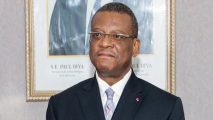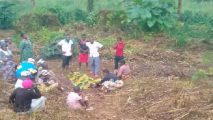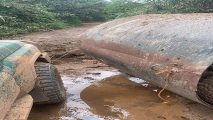Categories
Recent Posts
- Football: Panthère du Ndé Wins Cameroon Cup 2025
- Fifa brings in new £45 ticket for 2026 World Cup
- President Sisiku Ayuk Tabe, top aides to appear before the Supreme Court
- Pressure mounts on Biya as speculation grows over possible replacement of Ngute
- 2025 is the year when Biya’s long rule finally lost its last convincing justification
Archives
- December 2025
- November 2025
- October 2025
- September 2025
- August 2025
- July 2025
- June 2025
- May 2025
- April 2025
- March 2025
- February 2025
- January 2025
- December 2024
- November 2024
- October 2024
- September 2024
- August 2024
- July 2024
- June 2024
- May 2024
- April 2024
- March 2024
- February 2024
- January 2024
- December 2023
- November 2023
- October 2023
- September 2023
- August 2023
- July 2023
- June 2023
- May 2023
- April 2023
- March 2023
- February 2023
- January 2023
- December 2022
- November 2022
- October 2022
- September 2022
- August 2022
- July 2022
- June 2022
- May 2022
- April 2022
- March 2022
- February 2022
- January 2022
- December 2021
- November 2021
- October 2021
- September 2021
- August 2021
- July 2021
- June 2021
- May 2021
- April 2021
- March 2021
- February 2021
- January 2021
- December 2020
- November 2020
- October 2020
- September 2020
- August 2020
- July 2020
- June 2020
- May 2020
- April 2020
- March 2020
- February 2020
- January 2020
- December 2019
- November 2019
- October 2019
- September 2019
- August 2019
- July 2019
- June 2019
- May 2019
- April 2019
- March 2019
- February 2019
- January 2019
- December 2018
- November 2018
- October 2018
- September 2018
- August 2018
- July 2018
- June 2018
- May 2018
- April 2018
- March 2018
- February 2018
- January 2018
- December 2017
- November 2017
- October 2017
- September 2017
- August 2017
- July 2017
- June 2017
- May 2017
- April 2017
- March 2017
- February 2017
- January 2017
- December 2016
- November 2016
- October 2016
- September 2016
- August 2016
- July 2016
- June 2016
Featured
 2025 is the year when Biya’s long rule finally lost its last convincing justification
2025 is the year when Biya’s long rule finally lost its last convincing justification  Young Cameroonians: Build social capital to succeed
Young Cameroonians: Build social capital to succeed  Eulogy for HRH Nfor Professor Teddy Ako of Ossing
Eulogy for HRH Nfor Professor Teddy Ako of Ossing  Will Fr. Paul Verdzekov recognize the refurbished and rededicated Cathedral in Bamenda were he to return today?
Will Fr. Paul Verdzekov recognize the refurbished and rededicated Cathedral in Bamenda were he to return today?  Cameroon apparently under a de facto federalism
Cameroon apparently under a de facto federalism
Most Commented Posts
 4 Anglophone detainees killed in Yaounde
4 Anglophone detainees killed in Yaounde
18 comments Chantal Biya says she will return to Cameroon if General Ivo Yenwo, Martin Belinga Eboutou and Ferdinand Ngoh Ngoh are sacked
Chantal Biya says she will return to Cameroon if General Ivo Yenwo, Martin Belinga Eboutou and Ferdinand Ngoh Ngoh are sacked
13 comments The Anglophone Problem – When Facts don’t Lie
The Anglophone Problem – When Facts don’t Lie
12 comments Anglophone Nationalism: Barrister Eyambe says “hidden plans are at work”
Anglophone Nationalism: Barrister Eyambe says “hidden plans are at work”
12 comments Largest wave of arrest by BIR in Bamenda
Largest wave of arrest by BIR in Bamenda
10 comments
Latest Tweets
Featured
-

Football: Panthère du Ndé Wins Cameroon Cup 2025
-

Fifa brings in new £45 ticket for 2026 World Cup
-

President Sisiku Ayuk Tabe, top aides to appear before the Supreme Court
-

Pressure mounts on Biya as speculation grows over possible replacement of Ngute
-

2025 is the year when Biya’s long rule finally lost its last convincing justification
-

Armed Mbororo tribesmen killed 8 in Southern Cameroons’ new war
-

Southern Cameroons Crisis: Atanga Nji Boys abduct 8 people en route to Kumbo
© Cameroon Concord News 2025
27, March 2025
Biya’s election season stirs renewed anxiety in Southern Cameroons 0
While Biya’s re-election in October seems all but inevitable, his prolonged stay in power – without meaningful dialogue or efforts toward a peaceful resolution – signals continued suffering and a deepening crisis for the Anglophone population.
At 92, Paul Biya, Africa’s second-longest-serving leader, announced in January that he would seek his eighth presidential term in the October elections, ending months of speculation over his candidacy.
In Anglophone Cameroon – the Northwest and Southwest regions – years of alleged electoral fraud, a deadly and protracted conflict and political exclusion have eroded faith in democratic participation. For the millions living there, daily life has become a constant struggle against fear, displacement and uncertainty.
Anglophone Cameroon has been engulfed in a deadly conflict for years, characterised by violence and deepening mistrust between separatist groups and the central government, which many in the region accuse of systemic human rights violations.
In search of recruits
On some nights in Tiko, a coastal town in Cameroon’s troubled Southwest region, 39-year-old Mbuh Margaret* stays awake while her two young daughters, both under 12, sleep nearby. Her eyes remain fixed on the door, her mind racing with fear of what might come.
“I don’t think I’ll ever recover,” she says, still haunted by the traumatic ordeal she endured in 2018 – an event that continues to cast a long shadow over her life.
That year, just weeks before the presidential election, separatist fighters stormed her home in a remote part of Bamenda, the Anglophone capital of Cameroon’s Northwest region. They arrived at midnight, demanding that her 43-year-old husband join their movement.
“They wanted more manpower against the government forces and were recruiting by any means necessary,” she recalls.
When he refused, they shot him in the head.
“I didn’t believe what I saw; everything happened in a second,” Margaret recalls.
Two days later, fearing for their lives, she fled with her daughters to Tiko, her late husband’s hometown. Now working as a farm labourer in a nearby village, she earns between CFA2,500 ($4) and CFA7,500 ($12) a week – barely enough to survive. Her meagre income forces her to borrow constantly, and the debts continue to mount.
Call for election boycott
Biya’s announcement of his candidacy for the October elections has reignited calls from separatist groups to boycott the vote in the Anglophone regions. Despite ongoing government crackdowns, separatist leaders argue that participating would only serve to legitimise Biya’s decades-long rule over their communities.
For Margaret and many others in the Anglophone regions, already enduring nearly nine years of conflict between separatist fighters and government forces, the election season brings renewed fear and uncertainty.
“In 2018, separatist groups first warned us to stay away from the election, using threats and violence to enforce compliance,” Margaret tells The Africa Report.
“At night, whenever I think about what led to my husband’s death, and how easily it could happen again, I lose my peace,” she says.
More than 6,000 killed
In October 2016, civil unrest broke out in Cameroon’s Anglophone regions when lawyers and teachers led protests against the marginalisation of English-speaking Cameroonians. The Francophone-led government in Yaoundé responded with force, shutting down internet services and branding the demonstrations a “terror procession”.
By 2017, what began as peaceful protests had spiralled into a full-scale separatist rebellion. Rebel leaders declared the independence of the self-styled Federal Republic of Ambazonia, claiming the Anglophone Northwest and Southwest regions. Though these areas make up just 3% of Cameroon’s territory, they are home to nearly 20% of its population.
As the conflict escalated, the government responded with a brutal crackdown, arresting thousands and opening fire on protesters. President Biya deployed the elite Rapid Intervention Battalion (BIR), a unit repeatedly accused of severe human rights abuses, to crush the separatist movement.
Nearly a decade later, the war drags on. More than 6,000 people have been killed, thousands remain missing, and hundreds of thousands have been displaced – many of them children struggling with malnutrition and disease in overcrowded camps or remote villages.
“It’s an ugly situation, and no one is safe,” says Beatrice*, 45, a resident of Kumba in the Southwest region. She lost her husband and three sons in a fire during a clash between separatists and government forces. She was the only one who survived.
‘We lost everything’
From Northwest’s Kumbo and Bamenda to Mamfe and Buea in the Southwest region, the scars of war are visible throughout Anglophone Cameroon. Bullet-riddled homes and abandoned buildings, left in ruins, have become common sights in communities where violence is now part of daily life.
Entire villages lie empty, silent evidence of what many describe as a partial genocide and a host of underreported war crimes. In these conflict-affected areas, children are among the most vulnerable. Many are forced into harsh agricultural labour or degrading work just to help their families survive.
“In late 2019, as government soldiers and separatist fighters exchanged gunfire in our village in Buea, my mother’s grocery shop was looted and set on fire,” says Peter*, a 15-year-old fisherman’s assistant in Limbe, a coastal town in the Southwest region. “I remember how we lost everything and became even poorer that night.”
Peter now earns between CFA15,000 ($24) and CFA24,000 ($38) a week, most of which goes toward supporting his family of five. According to UNICEF, nearly 500,000 children – including Peter and his childhood friends – were out of school across Cameroon’s Anglophone regions in 2024, as the conflict continues to disrupt education and displace communities.
As the crisis grinds on, Cameroon’s healthcare infrastructure continues to deteriorate, particularly in the English-speaking regions where medical facilities under Yaoundé’s control are often targeted in the conflict. The violence has forced many healthcare workers to flee, leaving residents to rely on private or religious clinics that are frequently overpriced, understaffed or ill-equipped.
Joy Francis*, a 19-year-old from a small village near Bamenda, tells The Africa Report that menstrual hygiene has become an overlooked emergency. Menstrual pads have either become unaffordable or completely unavailable, forcing many girls to use old rags or even thick leaves.
It’s a similar situation for Margaret, whose 12-year-old daughter also relies on scraps of old cotton during her period.
“It is disgusting and cruel for Paul Biya, a man who calls himself the father of the nation, to ignore the plight of Anglophone Cameroonians,” says a Douala-based political analyst, speaking anonymously due to a media ban on openly criticising the president.
“Without genuine political reform,” he warns, “we may be heading toward deeper anarchy in the English-speaking regions.”
Wave of violence
Ahead of the 2018 presidential election, Biya declared that Cameroon’s national unity was non-negotiable. Yet, both during his campaign and after securing re-election, he publicly acknowledged the severity of the Anglophone crisis, pledging to pursue a peaceful resolution. In 2019, he launched the Major National Dialogue aimed at addressing the grievances of the separatist movement.
However, separatist leaders and political critics dismissed the initiative as inadequate and unrealistic, arguing that it excluded key secessionist figures and failed to address fundamental demands, such as power-sharing or the prospect of independence.
“The crisis worsened, but Biya was not interested in recognising the separatist movement or their demands,” says a Yaoundé-based political analyst. “The peace plans were largely a political manoeuvre to convince the international community that the Anglophone unrest was merely a domestic issue that could be easily resolved.”
In reality, critics argue, little changed. Separatist leaders continued to be arrested and allegedly tortured, and before long, the dialogue collapsed – triggering yet another wave of violence and deepening the crisis.
Requests for comment from both the Cameroonian ministry of defence and the prime minister’s office went unanswered.
Possibility of Biya election loss?
Despite heavy media censorship in Yaoundé and state-controlled praise of Biya, French-speaking Cameroonians still discuss the future of their country, politics and economic policies in markets, offices and homes.
However, “when Cameroonians speak about their country, regime change rarely comes up”, says a senior lecturer and political analyst in Yaoundé. He explains that beyond Biya’s deep-rooted ties to France and the West, his regime’s longevity is due in part to its ability to suppress dissent and avoid the mistakes that toppled other long-serving leaders. “From the Arab Spring to the rise of anti-French sentiment, Biya seems to learn from leadership gaps that have ended other regimes,” he says.
English-speaking Cameroonians seldom debate the possibility of Biya losing an election – because survival, not politics, is their most pressing concern.
“It’s about our lives first,” says Margaret. “We don’t know if we’ll be even more forgotten by our countrymen – and the world.”
As external funding dries up, separatist fighters have increasingly turned on the very communities they claim to defend, looting homes, kidnapping civilians and extorting so-called “liberation taxes”. Women are often the most vulnerable. “I pay these taxes,” Margaret says. “Many women have been raped on the farms for failing to pay.”
Though some separatist factions have allowed schools to reopen, fear still lingers. For Margaret, the risk is too great. “Until my daughters’ safety is assured, they stay at home,” she says. “It’s better they lose their education than their lives.”
Culled from The Africa Report